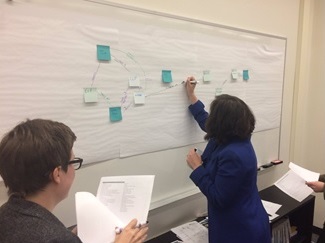In our workshop application we asked about your data ecosystem. There is no right or wrong answer to this question but we thought you might want some background and/or be curious about civic data ecosystems, so here’s a bit more detail.
What is a Civic Data Ecosystem?
The ecosystem analogy appears in a variety of different spaces and disciplines including business, social science, and innovation.
The idea of interconnectedness of actors, priorities, resources, and policies, as well as the need for sustained collaboration between organizations to create meaningful impact, is widespread even if the term “ecosystem” isn’t used. The important thing to remember is that an ecosystem approach recognizes that there are multiple participants and it is helpful to understand the relationships between those participants and their environments.
Civic data ecosystems consist of people/organizations connected with data in a local region and the infrastructure that supports this work. The Civic Switchboard project believes that libraries are valuable players in the civic data ecosystem and in those ecosystems where they aren’t involved, they should be!
Who is in my Civic Data Ecosystem?
As you think about who is part of your ecosystem, these are the types of people and organizations you might consider:
- Local and regional government agencies that are producers and users of data
- Non-profit organizations and community groups that use civic data
- Data intermediaries that help people find, use, and apply civic information
- Applied university centers that may use and share data
- Foundations that support civic data initiatives
- Journalists, bloggers, and individuals who make meaning of civic data
- Local businesses and others that add value to data by contextualizing it or creating access
- Coders, Code for America brigades, or other technical groups that use technology and civic data
- Libraries – in whatever local role they play!
The connections that exist among these players will take different forms depending on the community. They may include working together on projects and programming, providing funding and resources, and sharing missions and goals.
Mapping your Ecosystem
Due to the people, organizations, and relationships involved, ecosystems are complex! Inventorying or “mapping” your ecosystem can help you and your collaborators get a high level view of what is happening locally. An ecosystem mapping process can uncover players or relationships that aren’t documented, and start ecosystem discussions from a shared place of understanding.
Pittsburgh!
In Pittsburgh, the Western Pennsylvania Regional Data Center (WPRDC) led stakeholders in an ecosystem mapping exercise. This was part of our work with the Living Cities Civic Data Tech Collaborative.
The activity brought together individuals from the city and county government, public and academic libraries, Code for Pittsburgh, and student groups from local universities. We convened at the University of Pittsburgh’s central library.

We chose to visualize the ecosystem as a network of both people and organizations and counted both formal and informal partnership and activities as connections. Through our mapping process we chose to represent events, spaces and infrastructure as key parts of the ecosystem.
For the Pittsburgh team, this activity uncovered relationships that we didn’t realize existed. We also noted gaps in our own ecosystem knowledge and realized the need to bring more civic data players to the table. We were also able to unveil the diversity of roles that the public and academic libraries play, from providers of space to consultants on topics like data management. We will continue to build out our ecosystem map.
Some other examples:
- Microsoft’s Civic Graph visualizes the public and private sector working in the civic technology industry
- A more design oriented approach depicting the St. Louis startup ecosystem
- An inventory-style writeup from Detroit
Finally…
We’ve already begin to share more information on ecosystem mapping on our draft guide. You can check out our thoughts as we write them here – and let us know via twitter or email if we’re missing anything.
Don’t forget! The Atlanta workshop application deadline is March 9th!



